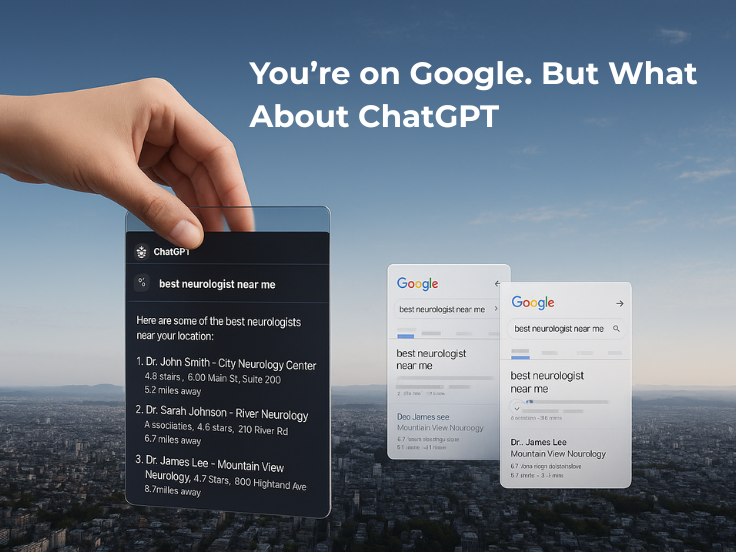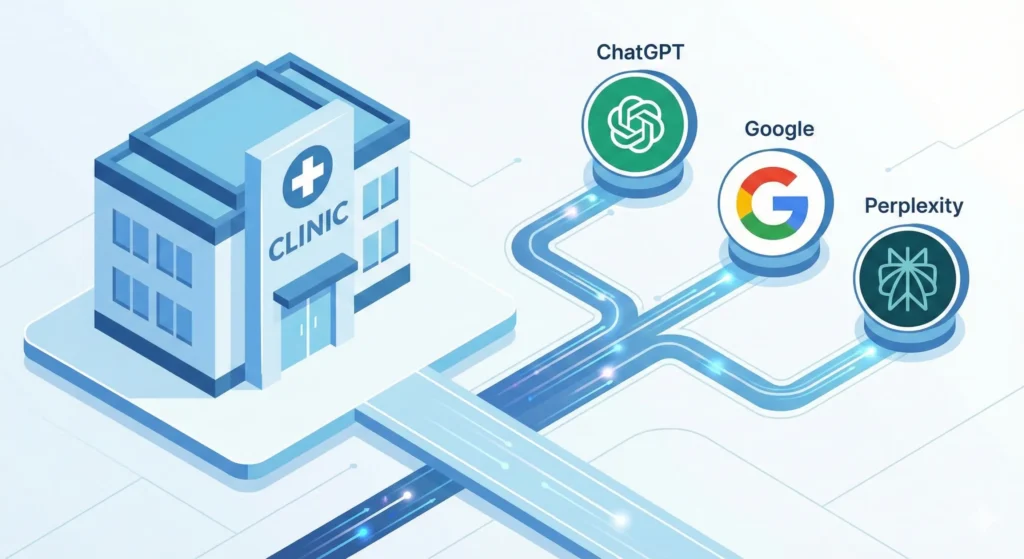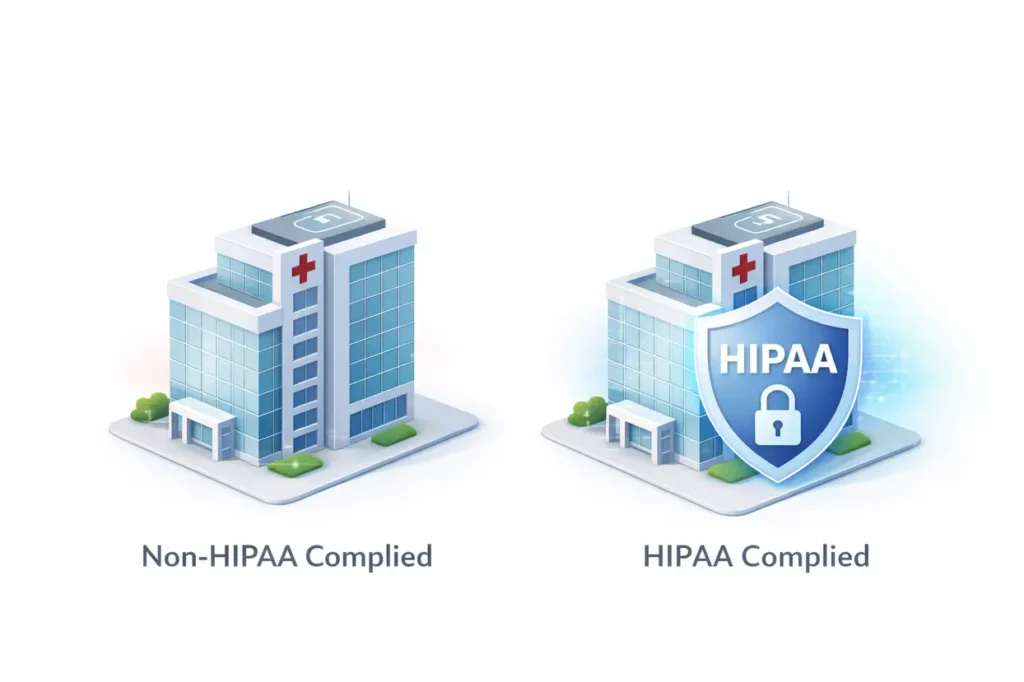“How do I make my clinic visible inside ChatGPT or Gemini answers?”
If you’ve ever wondered that, you’re already thinking ahead of 90% of other local businesses.
Welcome to the world of LLM SEO, a game-changing way to get discovered not just on Google, but inside AI tools like ChatGPT, Gemini, and Perplexity.
In this guide, we’ll explain exactly how you, as a clinic or local business owner, can use LLM SEO to get seen, quoted, and trusted by AI search, all in a simple, non-technical way.
What Is LLM SEO, in Simple Words?
LLM SEO stands for Large Language Model SEO.
It’s the process of optimizing your content so that AI tools like ChatGPT or Gemini can:
- Read it easily
- Understand the meaning behind it
- Trust it
- And recommend it in their answers
It’s not about ranking #1 on Google anymore. It’s about being the answer AI gives when someone says:
“Who’s the best gynecologist near me?”
“What are the symptoms of a slipped disc?”
“Can I get pregnant on my period?”
If AI models don’t understand or trust your content, they skip you entirely. That’s why LLM SEO is now crucial.
Why Clinics and Local Businesses Should Care
Let’s be honest. most clinics rely on word of mouth, old-school SEO, or paid ads.
But here’s the truth:
- 82% of patients now search online before choosing a doctor (even if your clinic is just 500 meters away)
- And now, many of them ask AI tools like ChatGPT or Gemini instead of Google
If your clinic isn’t mentioned in AI answers, you’re invisible, even to people who live on your street.
The Step-by-Step LLM SEO Plan for Your Clinic
Let’s break it down like a checklist — no jargon, no fluff.
Step 1: Start With Human-Friendly, FAQ-Based Content
People ask AI tools questions. So your website should have answers. Real answers. Clear, simple, conversational.
Start by writing blogs that answer questions like:
- Is IVF painful?
- What causes constant back pain?
- Can migraines be a sign of something serious?
How to make it LLM-friendly:
- Use real language, like you’d speak to a patient
- Write in short paragraphs, with headings
- Avoid keyword stuffing, focus on clarity
- Use examples, comparisons, analogies
Imagine ChatGPT is reading your blog to give advice. If your answer is better, it chooses you.
Step 2: Add Your Expertise (EEAT Signals)
AI models need to trust your content. Otherwise, they won’t quote it.
This trust is called EEAT – Experience, Expertise, Authoritativeness, Trustworthiness.
Quick wins:
- Add an author bio on every blog (e.g., “Written by Dr. Renu Lamba, MD – IVF Specialist”)
- Add photos, clinic address, and contact info clearly
- Link to verified associations or publications if any (Fertility Society of India, NMC profile, etc.)
- Use patient-friendly language, not academic tones
LLMs treat you like a verified expert if your site looks like it’s run by one.
Step 3: Add FAQ Schema and Medical Schema
Now, let’s talk about the technical magic, but don’t worry, it’s simple if you use WordPress or RankMath.
What to do:
- Use an SEO plugin to add FAQ Schema to every blog
- Use Medical Schema for condition or treatment-specific pages
- Add Author Schema so AI can “see” who wrote the article
This helps ChatGPT and Gemini understand the structure of your content and increases chances of being picked.
Step 4: Focus on Location-Based Clarity (For Geo Relevance)
Just like traditional local SEO, LLMs also care about where you’re located.
Tips:
- Mention your city or locality in every blog naturally (e.g., “Our Panchkula-based clinic sees many PCOS patients in their 20s…”)
- Create separate service pages with location tags (e.g., “Neurologist for migraines in Panchkula”)
- Make sure your Google Business Profile is up to date
- Link between your blogs and location pages internally
LLMs don’t guess your location. They need context from your content.
Step 5: Build a Content Cluster Around Each Service
Instead of writing one random blog about “IVF cost,” build a mini knowledge hub.
Example:
Main Service: IVF Treatment in Panchkula
Supporting Blogs:
- What Is IVF? Explained Simply
- IVF Success Rates After Age 35
- Can I Get Pregnant on My Period?
- IVF vs IUI: Which One Is Better?
Then link them all together.
Why this works: LLMs understand connections. A cluster of well-written, trustworthy blogs tells AI: “This clinic knows what they’re talking about.”
Step 6: Get Cited By Other Trusted Sources
Just like humans, AI looks for social proof.
How to build it:
- Get your clinic listed on medical directories like Practo, Lybrate, Justdial
- Publish an article in a reputed journal (even one local to your city)
- Write a guest blog on another trusted health site
- Get featured in news, press, or YouTube collaborations
Even one external mention can boost your AI credibility.
Step 7: Test and Track Your AI Visibility
Once your content is optimized for LLM SEO, start tracking where you appear.
Tools to try:
- Perplexity.ai – Search your clinic name, services, or city-based queries
- ChatGPT and Gemini – Ask sample patient-like questions and see if your site is cited
- Google Search Console – Still useful for traditional rankings
If you’re not showing up, revisit your EEAT, content clarity, or internal linking.
Final Thought: Google Isn’t Enough Anymore
It’s not about ranking anymore. It’s about being the trusted answer.
LLM SEO helps you do just that and if you’re a clinic, diagnostic center, or local health brand, this is the best time to get ahead of the curve.
The good news? You already have the real expertise. All you need is to present it in a way that AI understands and trusts.
Want to See If Your Clinic Is LLM SEO Ready?
Book a free audit with our team at RankVed.
We’ll analyze how your site is read by ChatGPT, Gemini, and Google and help you get discovered by real patients searching for your care.













